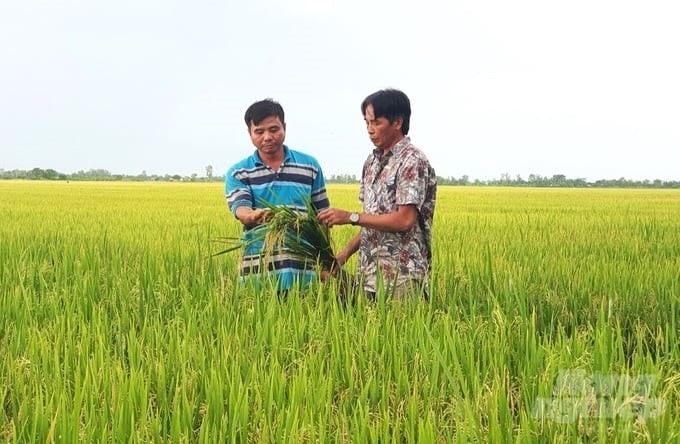- Giới thiệu
- Nhóm Công tác
- Tin tức
- Thông tin về FTA
- Tài Liệu
- Sự kiện
- Liên hệ
Transforming rice value chain to combat climate change
The 1.4 billion AUD grant will be used to carry out the project titled ‘Transforming the rice value chain to combat climate change and move toward sustainable development in the Mekong Delta.’

Making low-emission rice
Kien Giang Department of Agriculture and Rural Development collaborated with the Netherlands Development Organization (SNV) to hold a conference in Kien Giang province on the official announcement of the "Transforming Rice Value Chain to Address Climate Change and Move Toward Sustainable Development in the Mekong Delta" (TRVC).
The TRBC project is being executed by SNV in partnership with the Department of Crop Production (MARD) and the Departments of three provinces, namely Dong Thap, An Giang, and Kien Giang, under the auspices of the Department of Foreign Affairs and Trade in the phase 2023-2027.
Previously, the Kien Giang People's Committee issued Decision No. 2508/QD- UBND dated October 10, 2023, sanctioning financing of 1,425,220 AUD, equivalent to about 22 billion VND, to implement the project in the designated provinces.
Ms. Tran Thu Ha, Director of TRVC Project, stated that TRVC Project creates effective catalyzes and pioneerism to promote enterprises organize linking material areas in line with sustainability, and multiple values, bringing benefits and co-benefits on the socio-economic and environmental benefits for approximately 200,000 farming households through the pulling mechanism and through the participation of enterprises in the rice value chain.
"At the same time, creating a foundation for carbon credit certification, ready for transactions when the voluntary carbon credit market is piloted in 2025 and officially operational in 2028, as per Government Decree 06/2022."
Rice milling factories, seed production enterprises, fertilizer producers, and material suppliers established and operating legally in Vietnam have equal opportunities and are encouraged to submit applications and participate in the project for the chance to win attractive cash and non-cash prizes.
Simultaneously, as pioneering firms, the items or technology supplied by these enterprises are examined and approved by an internationally qualified inspection unit to minimize greenhouse gas emissions. This creates the groundwork for businesses to engage in the carbon credit exchange market in accordance with Vietnam's strategy until 2027.
Tens of thousands of farmers benefit from the project
The goal of the TRVC Project in Kien Giang is to reach 50-60 cooperatives and support the livelihoods of around 75,000 small-scale farmers on a production scale of 75,000 hectares. It aims to establish 10-20 rice value chains and support at least 10 major rice producers, processors, businesses, and exporters to enhance business efficiency through the provision of services, production, and processing. The project aims to reduce seed quantity by 30-40%, reduce chemical fertilizer and pesticide use in rice production by over 30%, and anticipate a reduction of 75,000 tons of CO emissions from rice cultivation. It ensures 40-50% profit for rice producers.
Mr. Le Huu Toan, Deputy Director of the Department of Agriculture and Rural Development in Kien Giang Province, stated that the TRVC Project in Kien Giang will help about 75,000 small-scale farmers apply climate change-responsive cultivation methods and raise awareness among 100% of small-scale rice farmers about the benefits of low-carbon rice production.
Approximately 50 agricultural technical officers in the province have enhanced their capacity in standardization and application of Measurement, Reporting, and Verification (MRV) activities in rice production. Support is provided to build a low-carbon rice brand for the domestic and international markets. Farmers, cooperatives, and rice-growing cooperatives may share rewards after the competition.
In phase I, interested enterprises will submit their Technical Proposal that details their proposed technology packages with justifiable rationale for higher economic value and lower GHG emissions efficacy, and other environmental and social values. Selected enterprises will make their self-investment in the testing (Phase I) and expand to large-scale rice production in the Mekong Delta in Phase II.
During phase I, the proposed technology packages will be tested and evaluated by an independent verifier. In phase II, selected sustainable rice production technology packages will be expanded at scale in An Giang, Dong Thap and Kien Giang provinces.
Tin liên quan
PSAV Attends the 30th Anniversary Celebration of Cargill Vietnam2025/10/23
Plant health management helps increase coffee yield up to 15%2025/10/16
An Giang to host 2025 OCOP forum for sustainable development2025/09/25
Viet Nam and France foster cooperation on blue economy and sustainable environment2025/09/29
Agriculture and Environment exhibition ready for National celebration2025/08/27



 Điều lệ hoạt động
Điều lệ hoạt động



















































